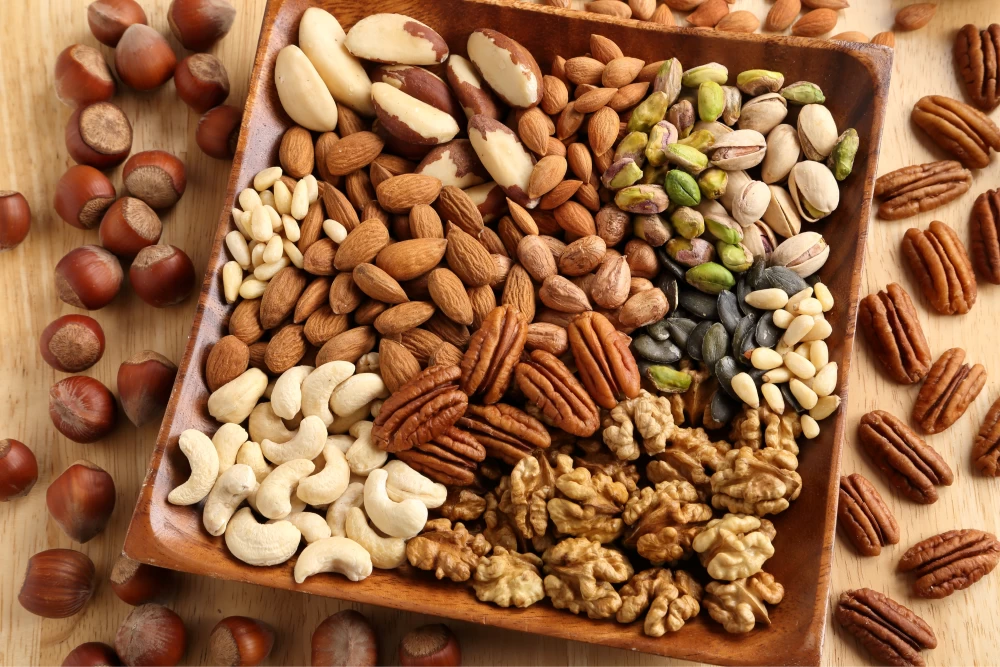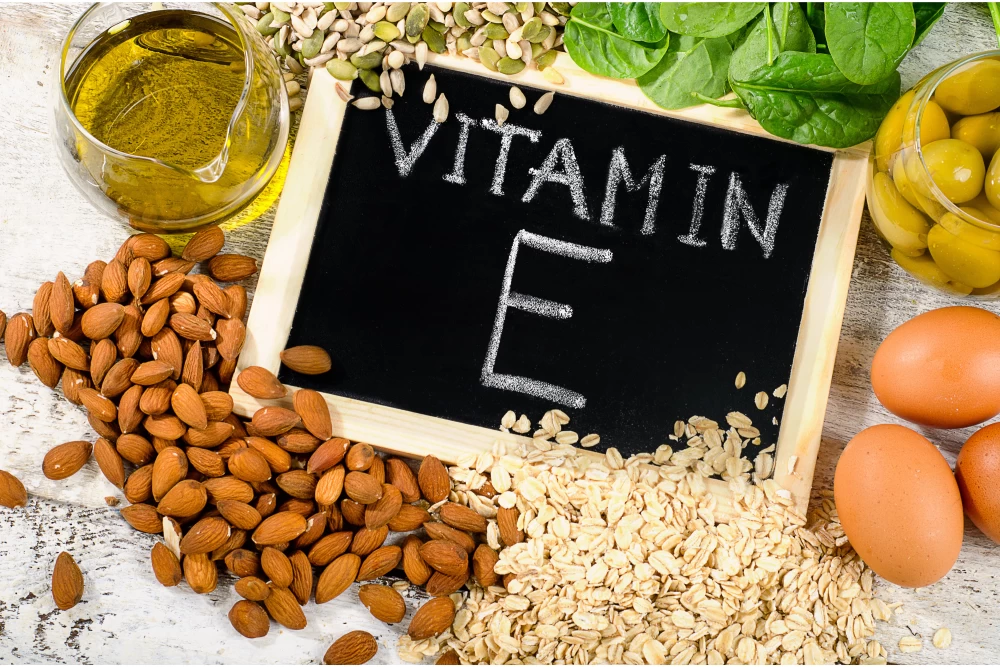
- 23rd March 2023
Table of Contents
What is Fatty Liver?
Fatty liver is a condition that occurs when fat accumulates in the liver cells. This buildup can result from excessive alcohol consumption, obesity, insulin resistance or type 2 diabetes, and high levels of triglycerides in the blood. The condition can cause inflammation and damage to the liver, leading to other serious health problems such as cirrhosis and liver failure. In some cases, fatty liver may have no symptoms at all, while in others it can lead to fatigue, weakness, abdominal pain or swelling. Nuts are an excellent source of healthy fats that can help reduce the risk of heart disease and improve overall health. However, for people with fatty liver disease who are trying to lose weight and improve their condition through dietary changes, nuts should be consumed in moderation due to their high calorie content. While nuts contain healthy fats known as monounsaturated and polyunsaturated fats that benefit heart health and reduce inflammation in the body which may also help improve fatty liver disease outcomes yet they also contain saturated fats which increase LDL cholesterol levels which increases cardiovascular diseases risk especially among those with NAFLD. In conclusion, while nuts offer many health benefits including reducing inflammation (which plays a role in NAFLD), lower LDL cholesterol (which is beneficial for cardiovascular disease) but they should be consumed within moderation by individuals with fatty liver disease due to their high calorie content which could hinder weight loss efforts.
Benefits of Eating Nuts
Nuts are known for their high nutritional value and have been associated with numerous health benefits. One of the most significant advantages is their potential to improve liver function, especially in individuals with fatty liver disease. Nuts contain healthy fats such as monounsaturated and polyunsaturated fats that can help reduce inflammation and improve insulin sensitivity, which leads to better liver health. Moreover, nuts are rich in antioxidants like vitamin E, which protect cells from oxidative stress caused by free radicals. This benefit can be essential for individuals with fatty liver disease because oxidative stress can accelerate the progression of the condition to more severe forms like cirrhosis or cancer. Additionally, nuts are a great source of fiber that helps reduce blood cholesterol levels and promote bowel regularity. However, it's essential to consume nuts in moderation since they're also high in calories and fat content. Overconsumption of nuts can lead to weight gain and other related health issues if not done carefully. Therefore it's important to consult a healthcare professional before adding nuts into your diet plan if you have any underlying medical conditions or allergies that could affect your health negatively.
Health Risks with Eating Nuts
While nuts are known for their healthy fats and various nutrients, excessive consumption can lead to several health risks. One such risk is the development of fatty liver disease. Nuts are high in calories and fat, so eating them in large quantities can contribute to weight gain and an increased risk of fatty liver disease. Additionally, some nuts contain aflatoxins, which are carcinogenic compounds that can damage the liver. Despite these risks, nuts also offer potential benefits for those with fatty liver disease. Some studies have shown that consuming certain types of nuts, such as walnuts and almonds, may improve liver function and reduce inflammation in individuals with non-alcoholic fatty liver disease (NAFLD). However, it's important to consume nuts in moderation as part of a balanced diet. Overall, while incorporating nuts into your diet can provide numerous health benefits, it's crucial to be mindful of portion sizes and choose varieties that are less likely to contain harmful toxins like aflatoxins. By doing so, you can enjoy the benefits of these tasty snacks without putting yourself at risk for serious health problems like fatty liver disease.
Types of Nuts for Fatty Liver
1. Walnuts: These nuts contain α-linolenic acid (ALA), which is a type of omega-3 fatty acid that can help reduce liver inflammation and prevent liver damage. Additionally, walnuts are rich in antioxidants like vitamin E, which can protect the liver from oxidative stress caused by free radicals.
2. Almonds: Almonds are high in monounsaturated fats, fiber, and vitamin E. They have been shown to improve insulin sensitivity and reduce inflammation in people with non-alcoholic fatty liver disease (NAFLD). However, it is crucial to note that almonds also contain phytic acid, which can interfere with mineral absorption if consumed in large quantities.
3. Pistachios: Pistachios are another nut rich in monounsaturated fats and fiber. A study found that consuming pistachios for 12 weeks improved liver function tests in patients with NAFLD.
It's important to remember that while nuts can have benefits for those with fatty liver disease, they should be consumed as part of a balanced diet and not as a replacement for other healthy foods like fruits and vegetables. It is recommended to consume small portions of unsalted nuts daily while avoiding processed or flavored varieties that may contain added sugars or unhealthy oils.
Recommended Intake

It is important to consume nuts in moderation, especially for individuals with fatty liver disease. According to research, a daily intake of 1-2 ounces of nuts can be beneficial in reducing the risk of developing liver disease. However, consuming excessive amounts of nuts can lead to weight gain and may exacerbate fatty liver disease. Furthermore, it is essential to consider the type of nuts being consumed. Nuts that are high in monounsaturated and polyunsaturated fats such as almonds, walnuts, and pistachios have been shown to improve liver health. On the other hand, nuts that are high in saturated fats such as macadamia nuts and Brazil nuts may increase inflammation and worsen fatty liver disease. In conclusion, incorporating a moderate amount of certain types of nuts into your diet can provide numerous health benefits for those with fatty liver disease. It is crucial to consider portion sizes and opt for varieties that are high in healthy fats while avoiding those with high levels of saturated fats when including them in your diet plan.
Cooking Tips for Healthy Results
Nuts are an excellent source of healthy fats, fiber, and protein. They also contain essential vitamins and minerals that are crucial for maintaining good health. However, people with fatty liver disease need to be cautious about consuming nuts as they are high in calories and fat content. To reap the benefits of nuts without increasing the risk of fatty liver disease, it is recommended to consume them in moderation. A handful of nuts per day can provide all the necessary nutrients without causing any harm to your liver. It is also important to choose unsalted nuts as excessive sodium intake can worsen the symptoms of fatty liver disease. Roasting or baking nuts can enhance their flavor and make them more enjoyable to eat. But be mindful of adding any extra oil or salt during this process as it will increase their calorie and sodium content. Incorporating roasted or baked nuts into salads or smoothies not only adds a crunchy texture but also provides a nutritious boost to your meals.
Conclusion: Summary of Benefits and Risks
In conclusion, incorporating nuts into your diet may bring about numerous health benefits, especially for individuals with fatty liver. Nuts are rich in healthy fats, antioxidants, and fiber that can help reduce inflammation levels in the liver and improve insulin sensitivity. Additionally, they may help prevent the development of nonalcoholic fatty liver disease (NAFLD). While nuts may offer a range of benefits to individuals with fatty liver disease, it is essential to consume them in moderation as they are also high in calories. Overconsumption can lead to weight gain and an increased risk of other health complications such as heart disease or diabetes. Moreover, some individuals have nut allergies that can cause severe reactions and lead to anaphylaxis. In summary, including nuts as part of a balanced diet has been shown to provide many health advantages for people with fatty liver disease. However, it is crucial to balance their intake with other foods while being mindful of any food allergies one might have. Consulting a healthcare professional before making any dietary changes is advisable for those who want personalized guidance on how best to incorporate nuts into their lifestyle safely.














